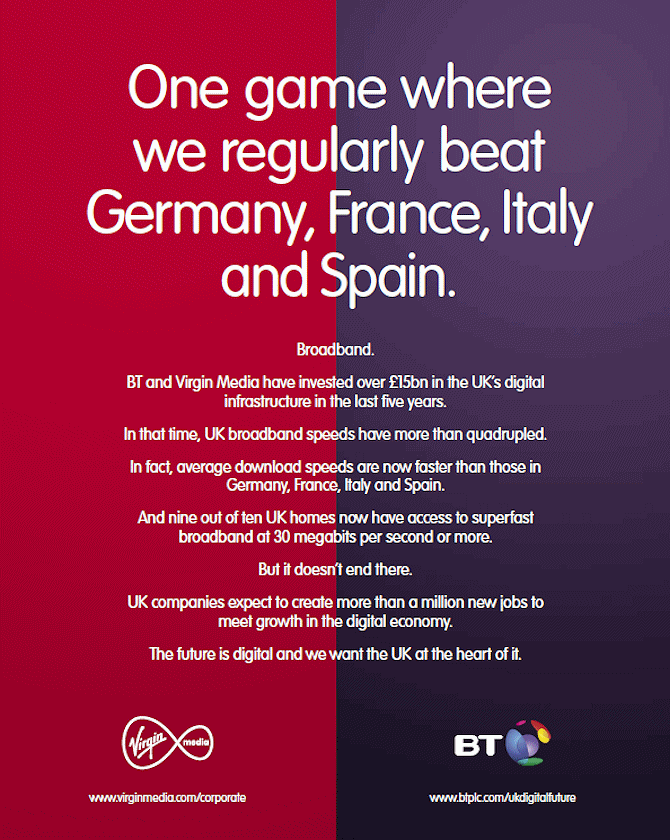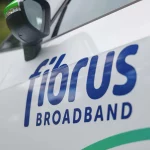BT and Virgin Media Start Joint UK Campaign to Oppose Openreach Split
Telecoms giant BT, with support from Virgin Media, will today kick off a new advertising campaign that aims to fight back against the persistent calls by rival ISPs and politicians for Ofcom to split them from control of their national network access division, Openreach.
Over the past few months BT has come under attack from almost all sides, with rival ISPs like TalkTalk, Sky Broadband and Vodafone repeatedly battering them through the ‘Fix Britain’s Internet‘ or similar campaigns (here and here). Meanwhile a wide selection of cross-party MPs now view a split of BT as being the only way to fix the country’s perceived broadband connectivity problems (here).
Advertisement
Never the less Ofcom recently proposed a deal that would aim to make Openreach more accountable and independent (here). BT appears to support, albeit begrudgingly, much of what the regulator has proposed, but they’re still in dispute over the push for Openreach to become a “ring-fenced, ‘wholly-owned subsidiary’ of BT Group, with its own purpose and board members.”
The regulator’s view is that full separation of Openreach from BT would be far too disruptive and that their half-way house solution would instead “provide Openreach with the greatest degree of independence from BT Group that is possible without incurring the costs and disruption – to industry and consumers – associated with separating the companies entirely.”
Gavin Patterson, BT Group’s CEO, said (Feb 2016):
“Separation would be costly and divert time and funding away from investment in UK infrastructure, at a time when the UK is at a crucial stage of its development as a world-leading digital nation.
Surely those impatient to see yet more homes and businesses get better broadband would rather that the money, time and effort went into the next stages of Superfast broadband, and then into Ultrafast?”
However Ofcom has warned that if BT fails to reach an agreement then they will “reconsider whether BT and Openreach should be split into two entirely separate companies“, which has prompted BT’s fiercest rivals to come out of the woodwork again for one final assault before Ofcom’s decision (the consultation closes in October and a verdict is due before the end of 2016).
Naturally the CEO of BT Group, Gavin Patterson, has been signalling his intention to fight back for awhile and today that process will begin. As you’d expect BT’s advertising campaign will involve a mix of media and other efforts to highlight the operator’s impact upon UK broadband infrastructure and related investment.
Advertisement
Patterson has also picked up support from Virgin Media, which is another major UK infrastructure developer and as such they fear the potential for a negative impact upon investment into their own network that could occur if BT were to be split. Both are expected to tout a combined investment of £15bn into national broadband and telecoms infrastructure.
Tom Mockridge, Virgin Media CEO, said (Feb 2016):
“The best way to provide competition against BT and its inherited advantages is to support infrastructure investors like Virgin Media. We are challenging the incumbent with £3bn of investment in new network and providing choice.
Ofcom has done the right thing by resisting separating Openreach, which would have sent a negative signal to infrastructure investors.”
By comparison Sky Broadband, TalkTalk and Vodafone prefer the lower cost and less risky approach of piggybacking off Openreach’s network rather than building their own. In fairness it would be very hard for them to build their own when much of the market already has two major infrastructure providers (focusing on the lucrative urban and sub-urban areas). Meanwhile rural areas would be more of a challenge for the commercial ISPs, just as it is for almost everybody else.
Ofcom also agrees that Openreach “still has an incentive to make decisions in the interests of BT, rather than BT’s competitors, which can lead to competition problems” (here), thus BT and Virgin’s non-infrastructure rivals see a split as being one way to tackle BT’s hold and at the same time boost their own network ideals (e.g. FTTP/H in UK urban areas) without needing to start from scratch.
By comparison Ofcom’s approach seeks make it easier for rivals to build their own networks by making use of Openreach’s existing infrastructure, albeit without making Openreach itself completely independent. It’s a model that may attract some interest from alternative network providers, although nobody is entirely sure about how much this will actually improve the wider market.
Advertisement
Gavin Patterson, BT’s CEO, said (Telegraph):
“BT and Virgin Media may be commercial rivals but we both have a proud track record of investing billions of pounds in the UK’s digital infrastructure. It’s important post-Brexit that we don’t talk the country down and that the right climate exists for further investment.”
Into this fight Virgin Media has hinted that they may boost their £3bn Project Lightning network expansion, which is currently extending the operator’s ultrafast cable (DOCSIS) and fibre optic (FTTP) based broadband network to reach an additional 4 million premises by 2019 (around 60-65% UK coverage).
Similarly BT has linked their planned roll-out of 300Mbps+ G.fast to “most of the UK” (by 2025) to the same decision, although no doubt their rivals would contest that an independent Openreach could perhaps deliver even faster pure fibre optic (FTTH/P) connectivity to a similar proportion of the population (assuming the right level of investment were attracted and a longer timescale for deployment).
However in BT’s eyes a lot of recent media reports have been peddling untrue comments about their service and infrastructure. In keeping with that a recent non-confidential staff notice appears to give us a small indication of what the new advertising campaign, or at least part of it, might focus on (credit to Kitz).
Internal BT Notice
There are a number of misconceptions around at the moment about the health of the nation’s internet. So, if you get asked questions by friends, family or customers, here are the facts about superfast broadband coverage that you can use to help set the record straight.
The rollout of superfast broadband is one of the quickest and most ambitious anywhere in the world. And it’s available for all communications providers to use.
More households are now using superfast broadband in the UK than in Germany, France, Italy or Spain.
Nine out of ten UK homes have access to superfast broadband. And we’re adding another home every 30 seconds.
Over 91% of UK premises have access to superfast broadband.
We’re on track to help government achieve their target of 95% coverage by the end of 2017. And we want to go even further.
Thanks for helping us put the record straight by keeping to the facts above.
Did you know?
Independent research shows if we had only used FTTP (Fibre to the premises) technology rather than a mix of FTTP and FTTC (Fibre to the cabinet), the UK would now be at c40% coverage rather than the 91% coverage we have today. This means many more can benefit from superfast broadband.
Openreach has built the largest FTTP network in the UK offering services to more than 300,000 homes and businesses.
Openreach will roll out ultrafast speeds via G.fast to 10m premises by the end of 2020 and aims to connect up to an additional 2m premises with FTTP by 2020.
The UK leads the top 5 EU economies on virtually all key measures of superfast broadband coverage, take-up, use and competition.
There are more than 100 fibre broadband providers to choose from.
Heard this?
Only 2% of people in the UK can get fibre broadband.
That’s incorrect. Through a mix of technologies FTTC, FTTP and third party networks more than 91% of UK premises have access to superfast broadband.
The 2% claim relates to just one type of fibre broadband, namely FTTP and ignores the vast FTTC network we have built.
UK has faster average download speeds than Germany, France, Italy and Spain.
Average UK broadband speeds have doubled in the last three years.
And increased twenty times in the last ten years.
Ultrafast speeds over 100mbps are on their way, with up to 12 million homes and businesses benefitting by the end of 2020.
Over the last 10 years BT has invested an average of £1bn every year in the UK infrastructure through Openreach, so the whole industry, and the whole country can benefit.
Last year we invested more than £1.4bn in our Openreach network and BT will continue to invest in the future.
More than 500 communications companies use our network – making the UK one of the most competitive markets for broadband in Europe.
Over the next three years, we plan to spend a further £6 billion on our fixed and mobile networks, delivering broader coverage, faster speeds and better service.
Last year, BT spent £0.5bn on research and development (R&D), making us one of the largest investors in R&D of any company in the UK and globally in the telecoms sector – enabling us to develop the very latest technologies such as G.fast.
On the “only 2% of people in the UK can get fibre broadband” remark, it doesn’t take an expert to spot that BT’s retort of this figure being “incorrect” is perhaps a touch misleading because the 2% figure is generally spoken as a specific reference to pure fibre FTTP/H technologies that can deliver Gigabit speeds and this should not be confused with slower hybrid-fibre FTTC. BT’s notice does highlight this, but without referencing the clear performance differences.
UPDATE 11:44am
Here’s a copy of the advert being run in newspapers etc. today.

Mark is a professional technology writer, IT consultant and computer engineer from Dorset (England), he also founded ISPreview in 1999 and enjoys analysing the latest telecoms and broadband developments. Find me on X (Twitter), Mastodon, Facebook, BlueSky, Threads.net and Linkedin.
« Sckipio Interview – What Can We Expect from BT’s G.fast Broadband Tech

















































Comments are closed